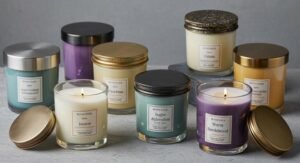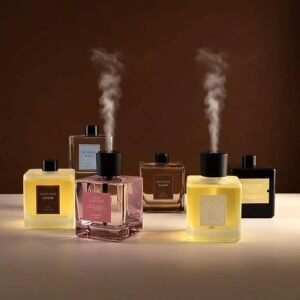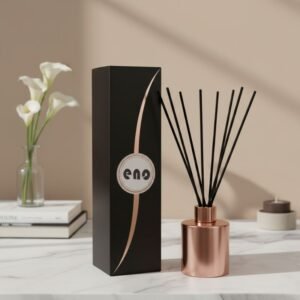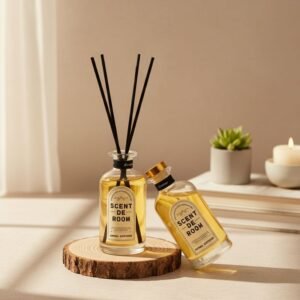Sprzedawcy detaliczni walczą o wyróżnienie produktów na dzisiejszym nasyconym rynku zapachów do domu, stojąc w obliczu silnej konkurencji i kurczących się marż zysku.
Dyfuzory trzcinowe marki własnej oferują sprzedawcom detalicznym wyjątkowe marże zysku na poziomie 40-60%, pełną kontrolę nad marką i elastyczność w tworzeniu niestandardowych zapachów, które budują lojalność klientów, jednocześnie zapewniając silne zróżnicowanie rynku.

Rynek zapachów do domu nadal szybko się rozwija, a raporty branżowe pokazują 15% rocznego wzrostu napędzanego przez konsumentów poszukujących spersonalizowanych doświadczeń wellness. Dyfuzory trzcinowe marki własnej zapewniają przedsiębiorcom przystępny punkt wejścia do tego lukratywnego sektora bez konieczności posiadania zakładów produkcyjnych lub dużych inwestycji kapitałowych. Nasze doświadczenie we współpracy z partnerami detalicznymi pokazuje, jak niestandardowe zapachy i markowe pojemniki tworzą trwałą przewagę konkurencyjną na rynkach lokalnych i internetowych.
Co sprawia, że dyfuzory zapachowe Private Label Reed są inteligentnym dodatkiem do biznesu?
Czy trudno jest wyróżnić się na dzisiejszym nasyconym rynku detalicznym? Wiele marek stoi przed wyzwaniem tworzenia unikalnych produktów przy jednoczesnym zachowaniu zdrowych marż zysku.
Dyfuzory trzcinowe marki własnej oferują sprzedawcom detalicznym wyjątkowe marże zysku na poziomie 40-60%, pełną kontrolę nad marką i elastyczność w tworzeniu niestandardowych zapachów, które budują lojalność klientów, jednocześnie zapewniając silne zróżnicowanie rynku.

Wyższe marże zysku napędzają rozwój firmy
Dyfuzory trzcinowe marki własnej zapewniają atrakcyjne korzyści finansowe, z którymi tradycyjne produkty detaliczne po prostu nie mogą się równać. Dzięki marżom zysku wynoszącym od 40% do 60%, produkty te znacznie przewyższają typowe marże detaliczne wynoszące 20-30%. Zwiększona rentowność wynika z wyeliminowania kosztów pośredników i bezpośredniej kontroli nad procesami produkcyjnymi.
Rynek dyfuzorów brandingowych umożliwia sprzedawcom detalicznym pozycjonowanie produktów w punktach cenowych premium przy jednoczesnym utrzymaniu konkurencyjnych kosztów produkcji. Gdy kontrolujesz zarówno rozwój niestandardowego zapachu, jak i projekt pojemnika, tworzysz unikalną propozycję sprzedaży, która uzasadnia wyższe marże. Ta elastyczność finansowa umożliwia reinwestycje w marketing, rozbudowę zapasów lub rozwój nowych produktów.
Budowanie tożsamości marki poprzez personalizację
Siła marek własnych polega na tworzeniu produktów, które odzwierciedlają unikalną tożsamość marki. Opcje dostosowywania pojemników obejmują kształty szkła, kolory, etykiety i projekty opakowań, które doskonale pasują do estetyki marki. Ten poziom personalizacji przekształca ogólne produkty w markowe doświadczenia, które klienci kojarzą konkretnie z Twoją firmą.
| Element dostosowywania | Wpływ na działalność | Korzyści dla klienta |
|---|---|---|
| Niestandardowe mieszanki zapachów | Zróżnicowanie rynku | Ekskluzywne doznania zapachowe |
| Markowe pojemniki | Zwiększona atrakcyjność na półce | Profesjonalne postrzeganie marki |
| Spersonalizowane etykiety | Lepsza rozpoznawalność marki | Wyraźna identyfikacja produktu |
| Elastyczność MOQ | Niższe bariery wejścia | Mniejsza inwestycja początkowa |
Opracowywanie niestandardowych zapachów szczególnie wzmacnia lojalność klientów poprzez tworzenie charakterystycznych zapachów niedostępnych gdzie indziej. Kiedy klienci rozwijają emocjonalne powiązania z konkretnymi zapachami, stają się stałymi nabywcami, którzy aktywnie poszukują Twojej marki zamiast konkurencji. Ten emocjonalny branding napędza długoterminową stabilność biznesową i zmniejsza koszty pozyskiwania marketingu.
Jak niskie wymagania MOQ obniżają bariery wejścia?
Marki startupowe borykają się z przytłaczającymi kosztami zapasów i presją przepływów pieniężnych, które często zabijają obiecujące przedsięwzięcia przed ich rozpoczęciem.
Niskie wymagania dotyczące minimalnej ilości zamówienia znacznie zmniejszają bariery wejścia, umożliwiając początkującym markom testowanie rynków przy minimalnym ryzyku finansowym, przy jednoczesnym zachowaniu elastyczności zapasów i umożliwieniu stopniowej skalowalności biznesu.
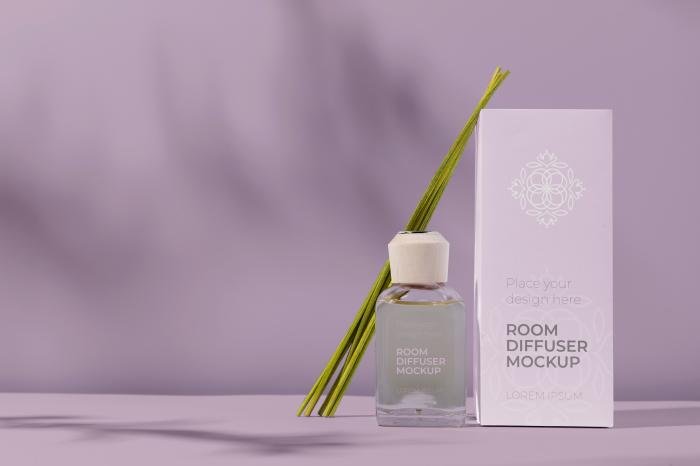
Redukcja ryzyka finansowego dla nowych przedsięwzięć
Niskie wymagania MOQ służą jako finansowe koło ratunkowe dla wschodzących marek wchodzących na konkurencyjne rynki. Tradycyjni producenci często wymagają znacznych inwestycji z góry poprzez wysokie minimalne ilości zamówień, zmuszając małe firmy do zaangażowania tysięcy dolarów przed zweryfikowaniem popytu na rynku. Takie podejście tworzy bariery nie do pokonania dla przedsiębiorców z ograniczonym kapitałem.
Elastyczne zasady MOQ umożliwiają testowanie produktów bez nadmiernej ekspozycji finansowej. Nowe marki mogą zamawiać mniejsze ilości, aby ocenić reakcję klientów, udoskonalić receptury i dostosować opakowania przed skalowaniem produkcji. Takie iteracyjne podejście zapobiega gromadzeniu kosztownych zapasów i zmniejsza ryzyko niepowodzenia produktu.
Zalety operacyjne i zdolność adaptacji do rynku
Marki rozpoczynające działalność czerpią znaczne korzyści z elastyczności operacyjnej, jaką zapewniają niskie wymagania MOQ. Zamiast przechowywać duże ilości zapasów, które wiążą kapitał obrotowy, firmy mogą utrzymywać szczupłe operacje, jednocześnie szybko reagując na informacje zwrotne z rynku.
| Tradycyjne MOQ | Korzyści wynikające z niskiego MOQ |
|---|---|
| 5 000-10 000 sztuk | 100-500 jednostek |
| $ 15.000-50.000 inwestycji | $1,500-7,500 inwestycja |
| Zapasy na 6-12 miesięcy | Zapasy na 1-3 miesiące |
| Ograniczone możliwości testowania | Wiele iteracji produktu |
Takie skalowalne podejście pozwala markom na stopniowe rozszerzanie linii produktów, testowanie różnych profili zapachowych i dostosowywanie opcji pojemników bez przytłaczających wymagań dotyczących przechowywania. Elastyczna struktura MOQ firmy Loveeno wspiera tę trajektorię wzrostu, oferując zarządzalne ilości zamówień, które są dostosowane do pojawiających się budżetów marek i możliwości operacyjnych, umożliwiając udane wejście na rynek poprzez strategiczne zarządzanie zapasami.
Które opcje opakowań zwiększają rozpoznawalność marki?
Sprzedawcy detaliczni stają w obliczu ostrej konkurencji przy wprowadzaniu na rynek linii dyfuzorów. Zły dobór opakowań prowadzi do tego, że niewidoczne marki gubią się wśród niezliczonych alternatyw na zatłoczonych półkach.
Szklane butelki ze strategicznym projektem opakowania zapewniają natychmiastową rozpoznawalność marki dzięki spójnym elementom wizualnym, wysokiej jakości materiałom i zrównoważonym opakowaniom, które rezonują ze świadomymi ekologicznie konsumentami.

Wybór materiałów wpływa na postrzeganie marki
Szklane butelki pozycjonowane jako opakowania premium natychmiast podnoszą postrzeganie marki w porównaniu z plastikowymi alternatywami. Sprzedawcy detaliczni czerpią korzyści z nieodłącznej atrakcyjności szkła na półce - jego waga, przejrzystość i jakość w dotyku komunikują jakość, zanim jeszcze klienci przetestują produkt. Przezroczystość pozwala na widoczność produktu przy jednoczesnym zachowaniu wyrafinowanego wyglądu, który uzasadnia wyższe ceny.
Wybór zrównoważonych opakowań jest zgodny z wartościami konsumentów, tworząc emocjonalne powiązania wykraczające poza zwykłą funkcjonalność. Gdy sprzedawcy detaliczni wybierają przyjazne dla środowiska szklane pojemniki, wykorzystują rosnący segment rynku, który priorytetowo traktuje odpowiedzialność za środowisko przy podejmowaniu decyzji o zakupie.
Elementy personalizacji, które budują rozpoznawalność
Strategiczna personalizacja przekształca zwykłe pojemniki w zasoby marki. Rozważ te elementy projektu opakowania, które maksymalizują rozpoznawalność marki:
| Element projektu | Wpływ na rozpoznawalność | Rozważania dotyczące MOQ |
|---|---|---|
| Niestandardowe wytrawianie szkła | 85% - poprawa rozpoznawalności marki | Ponad 5 000 typowych jednostek |
| Unikalne kształty butelek | Zróżnicowanie półek 70% | Minimum 10 000+ jednostek |
| Wysokiej jakości materiały na etykiety | 60% wzrost postrzeganej wartości | Ponad 1 000 opłacalnych jednostek |
| Nakładki oznaczone kolorami | Organizacja linii produktów 45% | Ponad 2500 jednostek w standardzie |
Pozyskiwanie szkła luzem umożliwia sprzedawcom detalicznym osiągnięcie konkurencyjnych cen przy jednoczesnym zachowaniu standardów jakości. Linie napełniające Loveeno obsługują różne rozmiary butelek, zapewniając spójną prezentację produktu w całych kolekcjach dyfuzorów, spełniając jednocześnie standardy pakowania ONZ w celu zapewnienia bezpiecznej wysyłki i zgodności logistycznej.
Jakie opcje personalizacji tworzą naprawdę unikalne produkty?
Większość sprzedawców detalicznych ma trudności z wyróżnieniem swoich produktów na przepełnionym rynku. Bez unikalnych opcji personalizacji marka gubi się wśród konkurencji.
Prawdziwe zróżnicowanie produktów powstaje dzięki kompleksowej personalizacji obejmującej branding wizualny, formułowanie zapachu i projektowanie opakowań. Elementy te współpracują ze sobą, tworząc wyróżniającą się obecność na rynku.
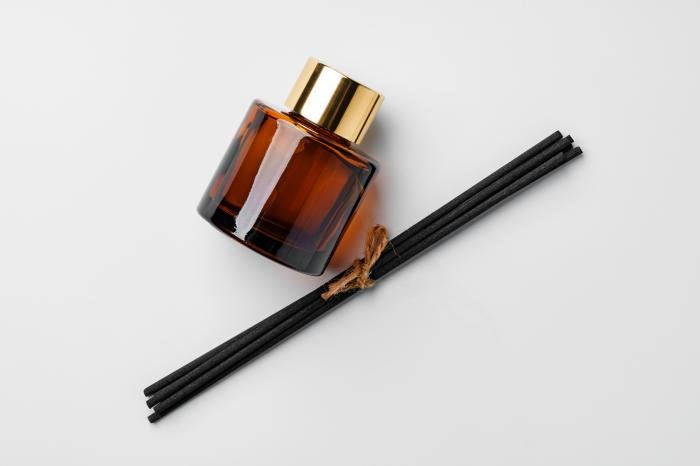
Tożsamość wizualna i elementy marki
Drukowanie etykiet służy jako podstawa tożsamości marki. Wysokiej jakości etykiety ze spójnymi elementami projektu zapewniają spójność marki w całej linii produktów. Naklejki z logo zapewniają elastyczność w zakresie zmian sezonowych lub edycji specjalnych przy jednoczesnym zachowaniu podstawowej rozpoznawalności marki.
Nowoczesne technologie druku umożliwiają tworzenie złożonych projektów z wieloma kolorami, teksturami i wykończeniami. Rozważ folie metaliczne, wytłaczane tekstury lub elementy holograficzne, aby stworzyć atrakcyjność premium. Kluczem jest zrównoważenie efektu wizualnego z kosztami produkcji i wymaganiami MOQ.
Formułowanie zapachów i dostosowywanie płynów
Opracowanie niestandardowego zapachu reprezentuje najbardziej krytyczny czynnik różnicujący. Charakterystyczne zapachy tworzą emocjonalne więzi, które zwiększają lojalność klientów i zachęcają do ponownych zakupów. Wielu producentów oferuje obszerne biblioteki zapachów, ale prawdziwie unikalne produkty wymagają indywidualnych receptur.
Kolorowy płyn do dyfuzorów dodaje kolejną warstwę personalizacji. Poza walorami estetycznymi, kolorowe płyny mogą wzmacniać kolory marki lub motywy sezonowe. Jednak stabilność koloru i kompatybilność z olejkami eterycznymi wymagają starannego rozważenia podczas formułowania.
| Typ personalizacji | Zakres MOQ | Czas realizacji | Wpływ na koszty |
|---|---|---|---|
| Drukowanie etykiet | 500-1,000 sztuk | 7-14 dni | Niski |
| Niestandardowy zapach | 1,000-5,000 sztuk | 14-21 dni | Średni |
| Konstrukcja butelki | 5,000-10,000 sztuk | 21-45 dni | Wysoki |
| Kolorowy płyn | 1 000-3 000 sztuk | 10-14 dni | Średni |
Innowacje w zakresie pojemników i opakowań
Personalizacja szklanych butelek wykracza poza standardowe kształty. Unikalne sylwetki, wytłoczone logo lub kolorowe szkło zapewniają wyróżniającą się obecność na półce. Chociaż niestandardowe formy wymagają wyższych MOQ, inwestycja zwraca się dzięki zwiększonej rozpoznawalności marki i postrzeganej wartości.
Projektowanie opakowań obejmuje zarówno opakowania podstawowe, jak i dodatkowe. Skoordynowane projekty, które opowiadają historię marki we wszystkich punktach styku, maksymalizują wpływ marketingowy i uzasadniają strategie cenowe premium.
Jak sprzedawcy detaliczni mogą z powodzeniem wprowadzić na rynek dyfuzory marki własnej?
Wprowadzenie na rynek dyfuzorów marki własnej wymaga starannego planowania, ale wielu sprzedawców detalicznych zmaga się ze złożonymi wymaganiami dotyczącymi wprowadzania produktów na rynek i procesami testowania zapachów, które opóźniają wejście na rynek.
Udane premiery dyfuzorów pod markami własnymi zależą od strategicznego partnerstwa produkcyjnego, kompleksowych protokołów testowania zapachów i zoptymalizowanych harmonogramów rozwoju, zwykle trwających od 4 do 8 tygodni, z wymaganiami MOQ zaczynającymi się od 1000 sztuk na SKU.
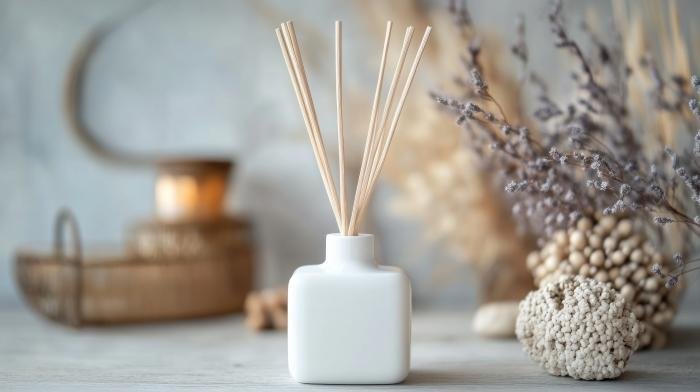
Planowanie osi czasu rozwoju strategicznego
Harmonogram wprowadzania produktu na rynek stanowi podstawę udanych przedsięwzięć związanych z dyfuzorami marek własnych. Sprzedawcy detaliczni muszą ustalić jasne kamienie milowe rozwoju obejmujące formułowanie zapachów, pozyskiwanie pojemników i zgodność z przepisami. Partnerstwa produkcyjne odgrywają kluczową rolę w usprawnieniu tych ram czasowych, a doświadczeni dostawcy, tacy jak Loveeno, oferują przyspieszone harmonogramy produkcji dzięki ustalonym sieciom zaopatrzenia w szkło luzem i zautomatyzowanym liniom napełniania.
Skuteczne zarządzanie osią czasu wymaga jednoczesnej koordynacji wielu elementów łańcucha dostaw. Inteligentni sprzedawcy detaliczni inicjują fazy testowania zapachów, jednocześnie uzyskując zgody na dostosowanie pojemników, skracając całkowity czas rozwoju z tradycyjnych 12-tygodniowych cykli do zoptymalizowanych 4-6 tygodniowych premier.
Testowanie zapachów i integracja marketingu sensorycznego
Testowanie zapachów wykracza poza zwykłe zatwierdzanie zapachu i obejmuje kompleksowe strategie marketingu sensorycznego, które zwiększają wyniki sprzedaży detalicznej. Według danych branżowych z 2024 r. firmy wdrażające strategiczny marketing zapachowy zgłaszają wydłużenie czasu przebywania klientów nawet o 40% i odpowiadającą mu poprawę sprzedaży. Sprawia to, że wybór zapachu jest krytyczną decyzją biznesową, a nie wyborem czysto estetycznym.
Sprzedawcy detaliczni powinni opracować protokoły testowania, które oceniają trwałość zapachu, wzorce dyfuzji i reakcje emocjonalne docelowych grup demograficznych. Profesjonalne usługi testowania zapachów pomagają zapewnić stałą jakość przy jednoczesnym zmniejszeniu ryzyka niezadowolenia klientów po wprowadzeniu produktu na rynek.
| Faza uruchamiania | Oś czasu | Kluczowe działania | Wskaźniki sukcesu |
|---|---|---|---|
| Planowanie | Tydzień 1-2 | Negocjacje MOQ, wybór zapachu | Podpisane umowy z dostawcami |
| Testowanie | Tydzień 3-4 | Testowanie zapachów, próbki pojemników | Ocena zgodności 90% |
| Produkcja | Tydzień 5-6 | Produkcja masowa, kontrola jakości | Zerowy wskaźnik defektów |
| Uruchomienie | Tydzień 7-8 | Konfiguracja ekspozycji detalicznej, marketing | Współczynnik sprzedaży 25% |
Współpraca produkcyjna z uznanymi dostawcami zapewnia dostęp do gotowych do spełnienia wymogów systemów logistycznych i sprawdzonych protokołów etykietowania zapachów, umożliwiając detalistom skupienie się na pozycjonowaniu na rynku, a nie na złożoności operacyjnej.
Wnioski
Dyfuzory trzcinowe pod markami własnymi stanowią szansę na transformację w handlu detalicznym, oferując wyjątkowe marże zysku na poziomie 40-60%, pełne zróżnicowanie marki poprzez niestandardowe opracowywanie zapachów oraz elastyczne wymagania dotyczące MOQ, które minimalizują ryzyko finansowe. Inteligentni sprzedawcy detaliczni wykorzystują wszechstronne opcje dostosowywania - od projektu szklanej butelki po charakterystyczną formułę zapachu - tworząc unikalną pozycję rynkową, która napędza lojalność klientów i trwałą przewagę konkurencyjną w szybko rozwijającym się sektorze zapachów do domu.
FAQ
P1: Jaka jest minimalna ilość zamówienia (MOQ) dla dyfuzorów trzcinowych marki własnej?
MOQ dla dyfuzorów trzcinowych marki własnej różni się w zależności od producenta, ale zazwyczaj waha się od 500 do 1000 sztuk. Niektórzy dostawcy mogą oferować niższe MOQ dla startupów, podczas gdy zamówienia hurtowe często mają obniżone ceny.
P2: Jak mogę dostosować opakowanie do moich dyfuzorów trzcinowych marki własnej?
Opakowania można personalizować, wybierając szklane butelki, dodając naklejki z logo i wybierając wzory etykiet. Wielu producentów oferuje opcje drukowania etykiet, w tym matowe, błyszczące lub wytłaczane wykończenia, aby dopasować je do estetyki marki.
P3: Czy istnieją określone standardy pakowania ONZ dotyczące wysyłki dyfuzorów trzcinowych?
Tak, dyfuzory trzcinowe zawierające łatwopalne ciecze muszą być zgodne ze standardami pakowania ONZ w celu zapewnienia bezpiecznego transportu. Normy te zapewniają szczelne i odporne na wstrząsy opakowanie spełniające międzynarodowe przepisy dotyczące transportu.
P4: Gdzie mogę hurtowo nabyć wysokiej jakości szklane butelki do dyfuzorów trzcinowych?
Szklane butelki można pozyskać od wyspecjalizowanych dostawców opakowań lub producentów marek własnych. Poszukaj dostawców oferujących trwałe, szczelne konstrukcje i opcje niestandardowego brandingu.
P5: Jakie są kluczowe kwestie dotyczące zgodności logistycznej podczas wysyłki dyfuzorów trzcinowych?
Kluczowe kwestie obejmują opakowania z certyfikatem UN, właściwe oznakowanie materiałów niebezpiecznych (jeśli dotyczy) oraz przestrzeganie wytycznych przewoźnika. Współpraca z dostawcą usług logistycznych posiadającym doświadczenie w wysyłce substancji zapachowych zapewnia zgodność z przepisami.
- Przewodnik po produkcji marek własnych dla dyfuzorów trzcinowych
- Najlepsi dostawcy opakowań dla szklanych butelek i etykiet
- Normy ONZ dotyczące opakowań produktów zapachowych
- Jak uruchomić własną markę dyfuzorów trzcinowych?
- Pozyskiwanie butelek szklanych luzem: Przewodnik dla sprzedawców detalicznych

